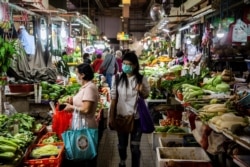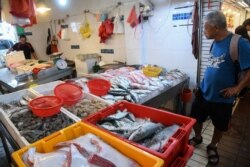As China scrambles to fully reopen its economy, political leaders and health experts elsewhere are pushing the country to permanently close so-called wet markets, such as the one in Wuhan where the COVID-19 pandemic is believed to have originated.
The World Health Organization supports reopening the wet markets that have stalls selling fresh fruits and vegetables, meat and fish. In some wet markets, live animals, poultry and sea creatures are sold and butchered for buyers. In China, they’re a common option for many people who may also shop for dry goods such as housewares and clothing in different sections of the market.
"But it is necessary to regulate [wet markets] and introduce measures to decrease the risk of transmission of diseases at them,” the WHO told Australian media in a statement Tuesday. It called for “adequate facilities, proper regulation and good hygiene practices. …”
Some are pushing back against that stance. Australian Prime Minister Scott Morrison called the WHO's support for reopening China’s wet markets "unfathomable."
"We need to protect the world against potential sources of outbreaks of these types of viruses," he said in an interview with 9News.
Last week, a bipartisan group of U.S. senators, led by Republican Sen. Lindsey Graham of South Carolina and Democratic Sen. Chris Coons of Delaware, asked China to “immediately close all operating wet markets that have a potential to expose humans to health risks” by introducing diseases that could jump from animals. The request came in a letter sent to China’s ambassador to the United States, Cui Tiankai.
But most wet markets that are re-opening in China sell chickens, rabbits, fish and reptiles such as frogs, quail and freshwater turtles for household consumption. Very few markets sell the kind of exotic wildlife — such as bats and pangolins — believed connected to the first cases of COVID-19. But outside China, especially in the West, they’re lumped into the wet market category.
“We’ve seen considerable government determination to shut down wildlife markets, which is commendable,” said Peter Li, associate professor of East Asian politics at the University of Houston-Downtown and a China policy specialist at Humane Society International. He told VOA there was consensus among the Chinese public that, at least temporarily, “these markets must be shut down and the safety of China's 1.4 billion people cannot be held hostage by the commercial interests of the country’s wildlife businesses.”
On February 24, China’s top legislature, the Standing Committee of the National People's Congress, banned the trade and consumption of wildlife, whether wild-caught or captive-bred. The move, considered the most comprehensive crackdown in decades on the trade, still left it open for other purposes, such as traditional Chinese medicine.
But wildlife markets remain.
Graham and another U.S. senator, Democrat Cory Booker of New Jersey, also pressed several U.N. organizations and international wildlife protection groups to take “aggressive action toward a global shut down of live wildlife markets and a ban on the international trade of live wildlife” not intended for conservation. Their comments came in a letter to the heads of the World Health Organization, the World Organization for Animal Health and the Food and Agriculture Organization. It was signed by more than 60 U.S. legislators.
Elizabeth Maruma Mrema, the U.N. Convention on Biological Diversity’s acting executive secretary, also called for a global ban on wildlife markets, during an interview with The Guardian last week. She urged an approach that considers the livelihoods of people involved in the wildlife trade.
VOA repeatedly phoned the Chinese Embassy in Washington for comment on the proposed bans, but its calls were directed to an extension and immediately disconnected.
WHO and epidemiological studies have linked the COVID-19 pandemic to wild animals sold at Huanan Seafood Wholesale Market in Wuhan, China. WHO says bats appear to the original source of the virus, while pangolins are suspected to be the intermediate host that passed it to humans. Local authorities have since shut down the market.
“Pangolins are not for meat consumption. They should not be on the market,” said Li, the Houston academic. Pangolin meat is considered a delicacy, and other body parts are used in traditional Chinese medicines.
Li, like many others, believes the unsanitary conditions in many wet markets, not just those selling wildlife “provided an opportunity for the viruses to mutate and to jump to humans.”
But wet markets safely serve many consumers in China and elsewhere in Asia.
“Wet markets are made up with independent and competing food vendors and they are widely established in cities in China and other Asian countries,” according to Zhenzhong Si, a research associate at the University of Waterloo in Ontario, Canada.
“Most of China's wet markets do not sell live wildlife, and live animals sold for consumption there are typically live poultry and aquatic products. These products are subject to relatively strict regulation,” Si told VOA Mandarin.
Wet markets are an important source of produce and fresh meat for urban residents, Si said, adding that shutting the markets could trigger food insecurity.
He called for managing “the small number of vendors that sell wild animals. The wildlife industry’s supply chain needs to be regulated, while the wet markets are only a part” of the wild animal trade.
The most recent ban would not apply to those species such as Asiatic black bears that are used in traditional Chinese medicine. Conservation activists worry that this exemption could enable continued wildlife sales on a black market.
China’s current Wildlife Protection Law encompasses hundreds of rare and endangered animal species, such as giant pandas, Siberian tigers and snow leopards. But the central government allows a few wild animals, such as bamboo rats and civet cats, to be bred in captivity and sold for consumption. And it condones the use of other non-endangered wild animals to be used for non-food purposes such as traditional Chinese medicine, fur and scientific research.













